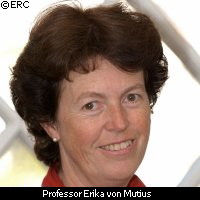ERC celebrates 1,000 frontier research ideas
The European Research Council (ERC) has celebrated its biggest landmark since its 2007 launch: 1,000 researchers have successfully clinched key financial support to conduct innovative 'blue sky' research. The ERC marked the symbolic awarding of the 1,000th grant, to Professor Erika von Mutius of the Ludwig-Maximilians- Universität München in Germany, at a special event in Munich, Germany on 24 June. Officials and leading researchers attending the ceremony included EU Commissioner for Research, Innovation and Science Máire Geoghegan-Quinn and ERC President Professor Helga Nowotny. Having set her sights on finding new ways to fight asthma and allergies, Professor von Mutius is making a major contribution to the success of the ERC's mission: to foster scientific excellence by encouraging and supporting Europe's top scientists, engineers and scholars to take risks in their research. Her research project, HERA ('Host-environment interactions in the protection from asthma and allergies'), has been allocated EUR 2.16 million under the ERC's Advanced Grant scheme. 'Professor von Mutius is a fantastic role model for young women and I hope that many will follow her in dedicating their work and their talent to science,' Commissioner Geoghegan-Quinn said. 'I am delighted to celebrate both her success and that of the European Research Council, which has come a very long way in a very short time and is delivering excellent results for science and for Europe. Investing in top talent in frontier research is pivotal, now more than ever, if we are to boost innovation as well as the competitiveness of Europe vis-à-vis the rest of the world.' Commenting on the path the ERC is on, as well as its success to date, Professor Nowotny said: 'It is extremely pleasing that we can celebrate today a new symbolic step in the life of the ERC. Having by now 1,000 top researchers in Europe who thrive and enthusiastically pursue their innovative ideas of the frontiers of knowledge is a big achievement that Europe can be proud of.' Professor Nowotny also noted that the ERC is instrumental in driving forward change. 'It benefits the European research system by setting the highest standards of scientific excellence in universities and research institutions which, in turn, will also attract industry eager to profit from excellent people and new ideas,' she underlined. For his part, Herbert Reul, Chairman of the European Parliament's Committee on Industry, Research and Energy, said EU Member States, particularly those not very active in the research sector 'shall be encouraged to invest a larger part of their gross domestic product in scientific research'. ERC programmes play a crucial role in promoting excellence on a national level as well, he said. 'The ERC has revolutionised European research funding within a just a few years. Today, it is definitely one of the most important new elements of the European Research Area,' said German Federal Minister of Education and Research Professor Annette Schavan, who attended the event. 'With the ERC, we have established a Europe-wide, perhaps even worldwide, competition that attracts outstanding scientists and researchers with the best ideas.' Early-career and senior top researchers, both in Europe and abroad, can obtain ERC funding. There are two calls for proposals each year. With a budget that stands at EUR 7.5 billion, the ERC is a significant component of the EU's Seventh Framework Programme (FP7). Every step the ERC takes is a giant leap for European research and innovation.
Countries
Germany



